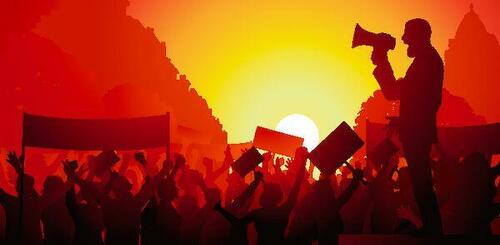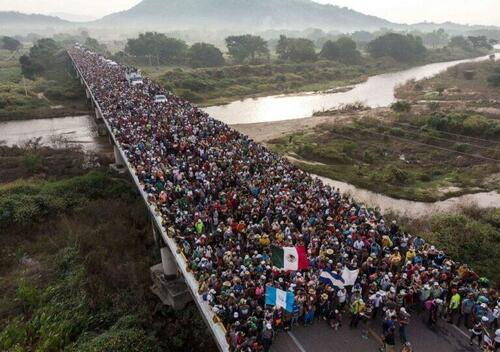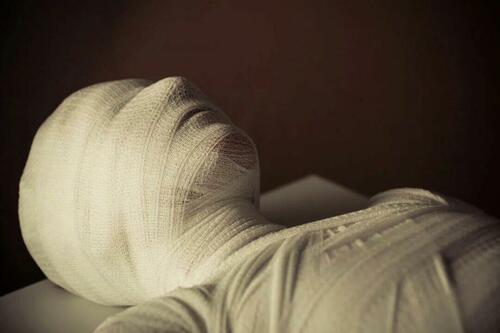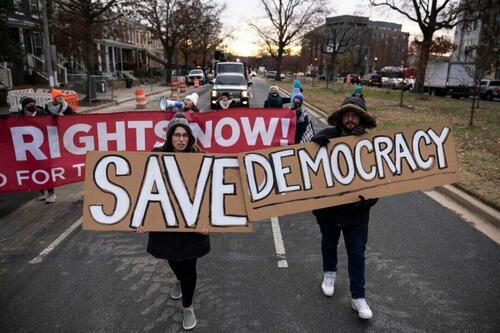What's really going on in Haiti? To understand the place and the hell hole it has become, knowledge of history helps. Here's a description from Doug Casey. You could add a few mitigating points: France didn't help much after independence and the US not at all since. But human history is not quite a story of harmonious development, from the Romans onward through the not so friendly Vikings and Huns to the rather violent conquistadors in South America. Yes Haiti has earthquakes and Typhoons but so does Japan. Countries which do develop, often pull themselves by the bootstraps. Think about Korea which after the Korean war was poorer than Chad! Haiti meanwhile was the homeland of Voodoo and other esoteric practices. Now it is said to be a haven for cannibalism. Let's hope this is not true but with a gang chief called "barbecue" you can most certainly expect the worst!
Via International Man
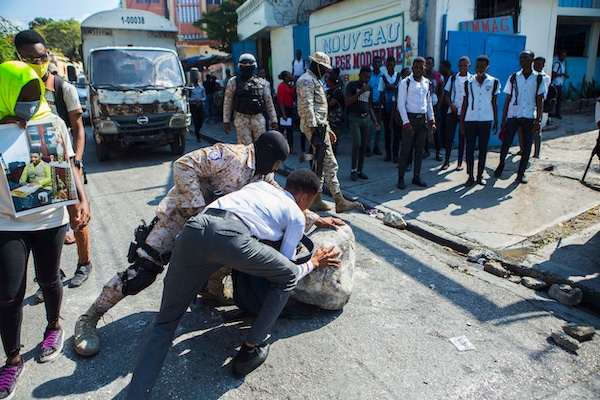
International Man: After Haiti’s president was
assassinated in 2021, Ariel Henry—a US ally—began serving as the acting
head of the country even though there was no election.
Recently, Henry flew to Africa to ask the Kenyan government to send
soldiers to help fight the armed groups increasingly taking control in
Haiti.
Before he could return, the armed groups took control of most of the country, and Henry recently resigned.
What’s your take on the situation?
Doug Casey: Chaos is par for the course in Haiti.
I’ve been there a half-dozen times since 1970 and have come to realize
that you have to put the current chaos in the context of Haiti’s
history, which is basically one disaster and tragedy after another. Let
me give you a brief rundown, starting with its independence after the
French Revolution.
The eviction of the French, starting in 1791, resulted in their first
real bloodbath after the slaves overthrew their masters. The place was a
slave colony from the very beginning and one of the richest places in
the hemisphere due to sugar production. The French lost 50,000 soldiers
trying to regain control of the island, killing about 350,000 Haitians.
Napoleon decided to cut his losses and write the place off. Haiti was
off to a bad start.
Incidentally, it was the only slave revolt in all of history that
resulted in an independent country. But Haiti has always had bad habits
as a result of its history.
After independence, the next ruler, JJ Desallines, massacred about
5,000 remaining whites in 1805. Subsequent rulers styled themselves as
kings or emperors for the rest of the 19th century, occupying themselves
with wars with the Spanish speakers in what became the Dominican
Republic on the eastern side of the island.
In 1824, about the same time Liberia was founded as an alternative
colony for blacks, 6,000 US slaves were exported to Haiti. But most of
them thought it was just too brutal and returned to slavery or poverty
in the US.
After a horrible century, Haiti had a 20-year respite when it was
occupied by US Marines from 1915 to 1934. It was a time of some order
and development, although several thousand Haitians who resented the
white occupiers were killed.
As soon as the Marines left, the Trujillo regime in the Dominican
Republic massacred about 30,000 Haitians living there. It was apparently
quite grisly; Haitians were hacked with machetes and driven into the
sea to be eaten by sharks. Dominicans and Haitians maintain poor
relations to this day.
Then came the election of Francois “Papa Doc” Duvalier in 1957.
Duvalier used his credentials as a voodoo houngan to his advantage. Fear
and psychological warfare, combined with the threat of violence, kept a
lid on the pressure cooker during his exotic reign.
Haiti’s history has been one of almost unremitting bloodshed,
poverty, disasters, and oppression. But a country’s history is different
from day-to-day life. Especially for the relatively few members of the
middle and upper classes, I’d say it was pleasant enough…
International Man: Doug, having spent time there, you are familiar with Haiti in a way most people aren’t.
What’s really going on?
Doug Casey: I first went there in 1970, when Papa
Doc was still alive. I can tell you that it was very safe in those days,
at least for a foreigner. You could walk anywhere in Port-au-Prince
late at night with money hanging out of your pockets, and nobody would
touch you.
Now, there were two reasons for that. Number one, at that time, Haiti
was socially pretty stable; the population was only a third of what it
is today. There were numerous light manufacturing enterprises set up by
foreigners to take advantage of the cheap labor. Reason number two was
that Duvalier had a praetorian guard, a secret police, called the Tonton
Macoute. They always sported dark sunglasses.
It was well known that if anybody harmed a tourist, they’d severely
regret it before their body was discovered the next day. Haiti was dirt
cheap. You could get a nice hotel room in downtown Port-au-Prince, with
breakfast and dinner included, for $10 a day. Some of the hotels were
very nice indeed, like the Olufsen. One night, I met Barry Goldwater,
who was having dinner at the next table.
In fact, it was looking so good for a while that a hotel called the
Habitation Leclerc was built with exceptional rooms and private pools
for each of the rooms. Now, it’s just an overgrown ruin filled with
vagrants.
I drove across the island to Cap Haitien. The roads were unbelievably
bad, but on the bright side, there were no other cars in either
direction. On the way, I passed an abandoned city called Duvalierville,
where Papa Doc was going to make a new capital. This is something Third
World countries can’t resist. They love the idea of building new
capitals. Haiti’s effort was a ruin, a testimony to the country’s
economy.
Haiti used to be a really nice place for a while, even as it
degenerated into an archetypical shithole. In fact, it was so pleasant
that I was thinking of moving there and starting a diving business. But
that was then. This is now and now is very, very different. So different
that the State Department’s usually worthless travel advisories should
be taken seriously. On my last visit we had to hire two armed guards
when going out.
International Man: The mainstream media is filled
with coverage of the cannibalistic gangs that have taken over the
country—including calls for the US government to “do something.”
Others have said claims of cannibalism are CIA propaganda aimed at
delegitimizing those who overthrew a US puppet and paving the way for
some kind of foreign intervention. In a recent statement, US Secretary
of State Anthony Blinken said that a “transitional council” is underway
to appoint a new interim government in Haiti.
What is the US government really up to in Haiti? Why do they have a history of meddling in this impoverished country?
Doug Casey: Cannibalism? Maybe it’s true since food
is hard to come by. Or maybe it’s just a rumor to make a statement, like
the human heads Mexican gangs used to post along highways. In any
event, it’s a mystery to me why anybody cares about Haiti. The country
produces absolutely nothing now—except rum—and I’m absolutely shocked
that the Barbancourt Rum company has somehow managed to stay in
existence.
One time, I met an American who managed the factory that made all the
major league baseballs. He was just getting completely fed up with the
place. Constant shakedowns from the government made him crazy; having to
deal with local bureaucrats overcame the advantages of cheap labor.
They moved baseball manufacturing out of the country. You’d only do that
as a last resort. They couldn’t make that business work because it was
just too crazy—and that was way before the current mass violence.
Haiti used to grow coffee and sugar, but it became uneconomic. Hand
labor with no machines just doesn’t pay. Mining might have worked, but
who would make a long-term capital-intensive investment in a chaotic
country with questionable property rights? Lots of Haitians produce art,
and some of it’s very good—but all the good artists have left Haiti.
Cruise ships used to go there, but you don’t bring cruise ships to
violent shitholes, forget about war zones.
So what is the future—if any—for this country? Why does the US have any interest in it?
Haiti has nothing but subsistence agriculture—and not much of that
because of theft. They don’t grow anything, they don’t make anything,
and they don’t export anything. It’s hard to see how they even subsist.
Their main export is people because anybody who can possibly get out
tries to get out. Remittances from Haitians living abroad and foreign
aid are the only sources of income. Tourism is totally dead for the
foreseeable future. Even ships with relief aid wind up trapped in the
harbor while their food cargoes rot from the heat. FWIW, no commercial
flights are coming or going from Haiti—zero.
International Man: In the US, Florida senators have asked President Biden to create a plan for dealing with the influx of Haitian migrants that will surely come into the country amid the chaos.
What do you think about this?
Doug Casey: Like I said, the main income of the
country is dollars sent by expats to relatives. And foreign aid, most of
which disappears down sundry ratholes. There are probably about 12
million people living in Haiti, but well over a million more are now
living in the US.
Some of the islands in The Bahamas have been completely taken over by
Haitians because it’s easier to get to than the US. Haiti will probably
become the 53rd US state after Washington, DC, and Puerto Rico. Soon to
be joined by the Ukraine, then by Israel. Then maybe Gaza will become
the 56th US state.
The problem is that Haiti has been ruled by criminals and criminal
gangs from Day One. Except now the government, long the most powerful
criminal gang, barely exists. Other criminal gangs have taken over the
place.
The situation can’t be solved easily. Sending in foreign troops, even
black ones from Kenya, is a nonstarter. On the bright side, it’s hard
to imagine anything happening that’s much worse than the 2010 earthquake
when something like 250,000 people died. That’s so many people that
it’s hard to imagine where they could even find places to bury them all.
Haiti has nothing except millions of penniless people.
International Man: Throughout Biden’s presidency,
we’ve seen an embarrassing retreat from Afghanistan, a failing war in
Ukraine, the overthrow of numerous US allies in Africa, and now this
situation in Haiti.
Is this yet another example of a failed foreign policy and the
declining influence of the US empire around the world? What are the
implications?
Doug Casey: Yes. The Bidenistas are so incompetent
that it makes me think Washington will look like Duvalierville if
they’re reinstalled in November. A failed foreign policy is one of the
many signs of a declining US.
One thing is for sure: What happens in Haiti should have absolutely
nothing to do with the US because none of it’s good. Perhaps Las Vegas’s
slogan, “What happens in Vegas, stays in Vegas,” can be restated as
“What happens in Haiti, stays in Haiti.” More likely, though, it will be
“Coming to a location near you!”
If property rights in the US were properly enforced, you wouldn’t
have the mass migration of penniless people. They’re not just escaping
the problems of their home countries. They’re being actively induced to
come to the US for free housing, free money, free cell phones, and free
medical care. Today’s immigrants are different from those of the 19th
century; they may have been penniless, but they had to make their own
way and provide for themselves.
The US is becoming the world’s dumping ground of criminal classes
from all around the world. I heard an anecdote the other day from
someone from Caracas. He said you don’t have to worry about someone
stealing your iPhone anymore because all the thieves have left for
richer pickings in the US.
So yes, it’s all about failed policies—bankrupt moral philosophies,
and raw stupidity, with a flavoring of bad intentions. Haiti’s problems
should stay in Haiti; they should solve their own problems. Instead,
Haiti’s problems are being exported to the US.
